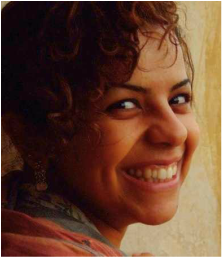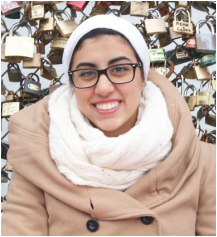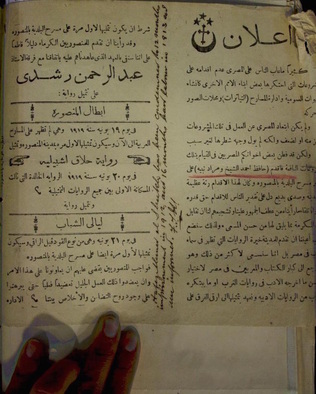|
Exploring al-Ghuria's Histories
Towards a critical consciousness of the writing and reading of Egyptian histories This course is offered by Alia MOSSALAM and Nayera ABDEL RAHMAN on Wednesday mornings and/or evenings. The course will be hosted for early birds from 10 am to 12:30 pm AND night owls from 5 pm to 7:30 pm provided that no less than five participants sign up per class. The thematic course runs for 10 weeks, March 21st through May 23rd, 2015 |
description
Write, History. Leave no one out, neither big nor small.
Write, for no one is ever too small,
none at all.
Write on a page, and leave the other blank
For tis those blanks my songs will fill!
Write, history...
- Ibrahim el-Mursi, Port Said, 1967.
Write, for no one is ever too small,
none at all.
Write on a page, and leave the other blank
For tis those blanks my songs will fill!
Write, history...
- Ibrahim el-Mursi, Port Said, 1967.
So sang resistance groups who fought in Port Said's war of attrition between 1967-1973. For a period widely remembered for its cornerstones in Egypt's military history - little is actually known of the stories of the battles waged by civilians during those years to keep Israeli invasion at bay.
This course will engage with the many silences and erasures that exist in academic, nationalist and military histories. Each week we will experiment with a different entry point into historical events - Archival material, Oral History, News-Papers, Poetry, Literature, and Architecture - and explore the nature of each historical research methodology, its politics, and the worlds they reveal and deny us. We will use these methodologies to re-explore the history of the al-Ghuria community.
Towards the end of the course, participants will select and explore how a single event can be re-told based on a narrative. Join us as we decipher the archives, listen to epics and popular songs of political events, flip through periodicals of the past, and tour the architecture of al-Ghuria in search of the seldomly told.
expectations
Participants are expected to actively engage with all course material. They are expected to visit state periodicals, access archives, attend performances, interview members of the al-Ghuria community, read indicated parts of a historical novel, take photographs of a telling piece of architecture or historical site, and bring their observations to class.
Participants will choose a moment in history to explore through various media discussed in class. Participants will select a mode of 're-telling' historical narratives either through Wiki-entries or online blogging, writing, or story-telling.
Participants are expected to contribute and share reflections and experiences of historical narratives.
why apply?
In this course we will raise questions where answers seem self-evident. We will ask questions such as:
(1) How can we tap into the many narratives behind a single historical event?
(2) Why are certain events silenced, and others brought out? How can we engage with these silences ourselves?
(3) How can archives be political? How can we access them in Egypt and elsewhere?
(4) Can memory be a reliable source for history? What do songs tell us about a particular event that academic narratives do not?
(5) Do newspapers tell us the whole truth? How can we read between the lines?
(6) Can novelists be historians? How much imagination is necessary for an understanding of a historical event?
(7) How can we sift through the layers of al-Ghuria's history by walking down its streets and alleys?
(8) How can we re-tell moments in history without ourselves silencing others?
This course will engage with the many silences and erasures that exist in academic, nationalist and military histories. Each week we will experiment with a different entry point into historical events - Archival material, Oral History, News-Papers, Poetry, Literature, and Architecture - and explore the nature of each historical research methodology, its politics, and the worlds they reveal and deny us. We will use these methodologies to re-explore the history of the al-Ghuria community.
Towards the end of the course, participants will select and explore how a single event can be re-told based on a narrative. Join us as we decipher the archives, listen to epics and popular songs of political events, flip through periodicals of the past, and tour the architecture of al-Ghuria in search of the seldomly told.
expectations
Participants are expected to actively engage with all course material. They are expected to visit state periodicals, access archives, attend performances, interview members of the al-Ghuria community, read indicated parts of a historical novel, take photographs of a telling piece of architecture or historical site, and bring their observations to class.
Participants will choose a moment in history to explore through various media discussed in class. Participants will select a mode of 're-telling' historical narratives either through Wiki-entries or online blogging, writing, or story-telling.
Participants are expected to contribute and share reflections and experiences of historical narratives.
why apply?
In this course we will raise questions where answers seem self-evident. We will ask questions such as:
(1) How can we tap into the many narratives behind a single historical event?
(2) Why are certain events silenced, and others brought out? How can we engage with these silences ourselves?
(3) How can archives be political? How can we access them in Egypt and elsewhere?
(4) Can memory be a reliable source for history? What do songs tell us about a particular event that academic narratives do not?
(5) Do newspapers tell us the whole truth? How can we read between the lines?
(6) Can novelists be historians? How much imagination is necessary for an understanding of a historical event?
(7) How can we sift through the layers of al-Ghuria's history by walking down its streets and alleys?
(8) How can we re-tell moments in history without ourselves silencing others?

Alia MOSSALAM has two passions. One is working with children using colors and the other is listening to people tell stories. Alia has recently completed a PhD that explores a popular history of Nasserist Egypt, through the stories told, and songs sung by the people behind the 1952 revolution, namely the workers who built the Aswan High Dam, the Nubians displaced by it, and the members of the resistance in Port Said and Suez, in 1956 and 1967 respectively. This is part of her continued research and interest in the stories behind the popular movements and revolutions that make Egyptian history but are seldom told. She is now engaged in a number of projects teaching youth inside and outside of academic institutions all over Egypt - and occasionally beyond - to dig deeper into their own personal and communal histories and explore ways to re-tell them creatively. She continues to look for these stories, and songs, in an attempt to recover a lost history of popular movements; and in hopes that one day, we may write our own.

Nayera ABDEL RAHMAN studied in the French section of the Faculty of Economics and Political Sciences at Cairo University. She pursued further study in Political Sociology at the Sorbonne in Paris where she obtained a Master's degree in 2013. In her thesis she looked at the 'associative actions' taken to promote education in Egypt between 2000 and 2011. Nayera co-founded of Education Square - a social initiative aiming at providing space for education practitioners in Egypt to network, share knowledge, collaborate and promote creative solutions to educational problems. She is a firm believer in bottom-up approaches to development. Her research interests are alternative education, social activism, youth and historical approaches. Nayera is joining CILAS as visiting fellow in the field of study Culture to coordinate the thematic course History of Education.


